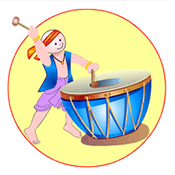
Dimdima
Online Children's Magazine from India

Dimdima
Online Children's Magazine from India

ARTICLE LIST
A man severe he was, and stern to view,
I knew him well, and every truant knew;
Well had the boding tremblers learn'd to trace
The days disasters in his morning face;
Full well they laugh'd with counterfeited glee,
At all his jokes, for many a joke had he:
Full well the busy whisper, circling round,
Convey'd the dismal tidings when he frown'd:
Yet he was kind; or if severe in aught,
The love he bore to learning was in fault.
These lines of Oliver Goldsmith describe a typical schoolmaster. This suggests that only frowning looks and severe actions could control the traunts. Why was he severe? His love for learning made him strict. He wanted his young ones to learn. That was his end result. So he was cruel to be kind. But is his means justified, though they are for a good cause?
Kamala Das’ poem is an answer to this question. She describes a child’s feeling on the constant nagging of a teacher - ‘why don’t you join the others? Why are you so peculiar?’ In spite of being in the midst of students, she feels as lonely as a cloud in the vast sky.
William Blake too writes
‘I love to wake up on a summer morn....... but hate to be watched by the cruel eye of the teacher.’
Why do children, who love everything, hate learning? Why do they hate school? Why do they hate teachers? They watch cricket match for hours! They read storybooks non-stop, they play games without feeling tired. But when it comes to studies - they can’t sit silently in class for a full period, they can’t learn non-stop for an hour why?
There are many reasons, but the main reason is the corporal punishment we teachers are resorting to! We make education a compulsory aspect. We develop a fear complex in them. We teachers use various methods of corporal punishment on them.
caning
whacking
flogging
thrashing
smacking
Such a punishment is not new. It ranges back to our forefathers, who were dealt with severely by their masters. The punishments were typical. They were made to sit like a chair to the wall (Godakurchi in Telugu), were made to go around on a donkey, were tied a with a heavy log around their neck, they were insulted etc., but they never minded. Those days were different. They were the golden days since they treated teacher as a God ‘Acharya Devo bhava’ and the students learnt willingly.
Now the days have changed, system has changed, the life style has changed, and the children’s attitudes have changed. Being in the teaching profession myself for more than three decades, I find a vast change between past and present. I was a mentor in legendary institutes like Sophia College, Swamy Vivekananda College, Arya Vidya Mandir in Mumbai and in St. Alphonsa’s junior college in Hyderabad. There were days when I moved amidst students with a cane in my hand. They dared not move an inch in my class. Though they liked my teaching, they were scared of me and I gloated over myself for being a disciplinarian. The word disciplinarian itself shows I watched them with four i’s (eyes) and hit them at the slightest opportunity.
Of course, I never enjoyed beating the students, though the students felt so. You watch any LKG child’s play! The child plays the game of a teacher with a cane. He enjoys the power of a teacher to punish so many! But is it not a shameful act for us teachers? When they treat it as a noble profession, they treat us as bullies.
Gandhi taught students in Tolstoy Form. Some of them were unruly. Once, a student was beyond control and Gandhi gave him a blow. He trembled as he hit him. If he so wished, he could have beaten back Gandhi, but he realized the pain Gandhi felt in beating him. Whether he changed for good or not, Gandhi never beat any other student again for he felt, he exhibited the brute in him. It pained me too whenever I punished my students. They never noticed my pain but I never knew how else I could be!
Sometimes when I asked the young ones, ‘suppose your children behave like this, how will you react? Pat came the reply ‘ I will punish them severely’. When they had no children, when they did not misbehave they were angry! Why can’t I be angry? That justified my anger.
On one occasion, I gave a hearty laugh in class and the whole class was delighted at it. I could see a sigh of relief in them. With happiness writ all over their faces, they continued listening! I even overheard a student saying, ‘Why can’t he be like this always!’ That decided my course of action. That was the be all and end all of all the beatings I gave!
I read ‘Only a vulgar mind would command a thing when he can get it with love for a mere asking.’ I understood the full beauty of it then.
I developed new techniques of my teaching. I made mathematics interesting, jovial and exciting. The students derived serendipitous joy - the joy of discovery - in doing Mathematics with me. Mind you, with me, not under me! I believe this is persuasive technique. Instead of thrusting a thing on someone, we can convince him of the beauty of a thing and its extended implication.
Now as a Director of St.Alphonsa’s school I am staunchly against corporal punishment. I do face the question sometimes when I beat the students earlier, why can’t they now? As I have already detailed upon - if we were bad once, we need not be bad forever. We need not continue to hand over bad things.
Why should we give up corporal punishment?
To begin with, I have my own daughter’s experience to quote. My daughter is good at dancing and her grasping power is tremendous. She can show expressions aptly. We enrolled her with a dance teacher who was a B.P. and a diabetic patient and whenever she arranged a programme she used to get very irritated. She threw her stick on the students ruthlessly. My daughter was scared of her but continued all the same till she herself was beaten once, for missing a class for a special reason. She refused to continue learning however much we tried. She gave up her life ambition for a small beating.
If the management encourages and endorses corporal punishment.
But ironically still, some institutions employ special brigade to just walk into a class and thrash erring students.
Of course, I do understand that to pass and implement such a rule - totally give up corporal punishment - evokes undoubtedly a terrific uproar. It is because for years together it has got into our blood - to spare the rod is to spoil the child.
My own experience vouchsafes against it. I have given up beating some 20 years ago, but the results were tremendous. Majority got cent percent. They loved their class work as much as I loved my subject.
There are many ways and means of exciting interest.
EXPLORE MORE...
Dimdima is the Sanskrit word for ‘drumbeat’. In olden days, victory in battle was heralded by the beat of drums or any important news to be conveyed to the people used to be accompanied with drumbeats.
Bharatiya Vidya Bhavan
K. M Munshi Marg,
Chowpatty, Mumbai - 400 007
email : editor@dimdima.com
Bharatiya Vidya Bhavan
505, Sane Guruji Marg,
Tardeo, Mumbai - 400 034
email : promo@dimdima.com
Dimdima.com, the Children's Website of Bharatiya Vidya Bhavan launched in 2000 and came out with a Printed version of Dimdima Magazine in 2004. At present the Printed Version have more than 35,000 subscribers from India and Abroad.